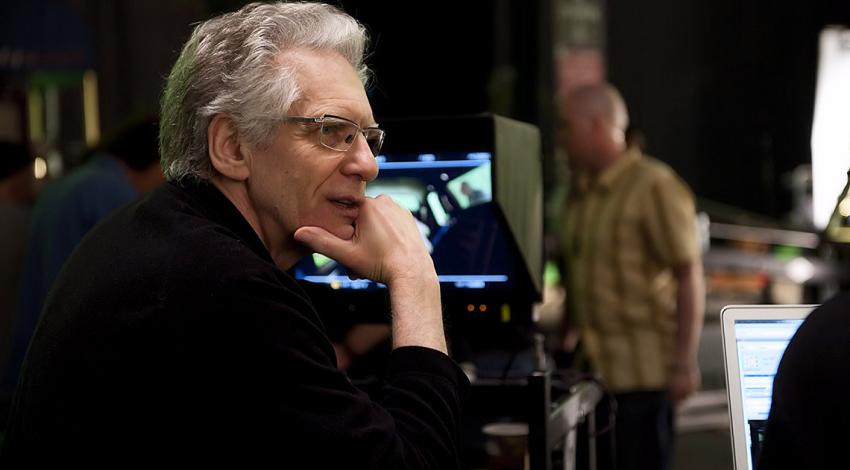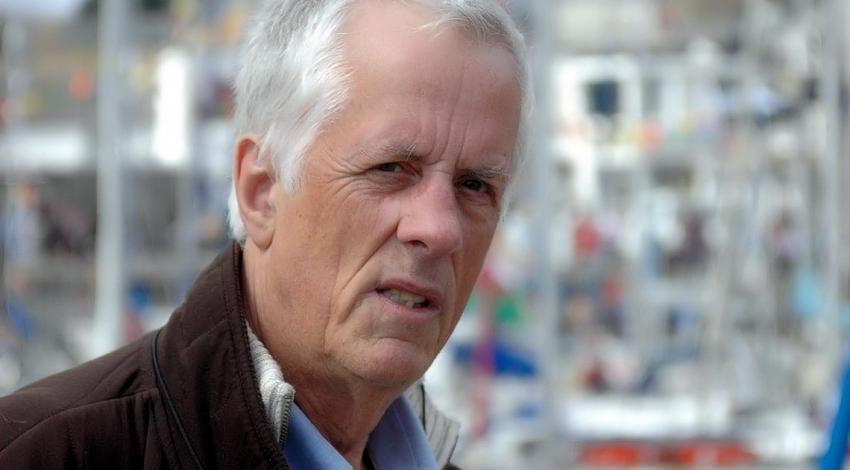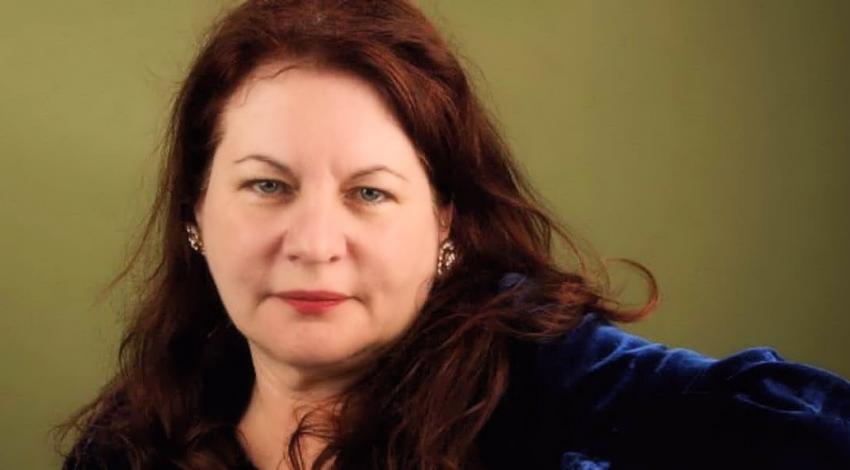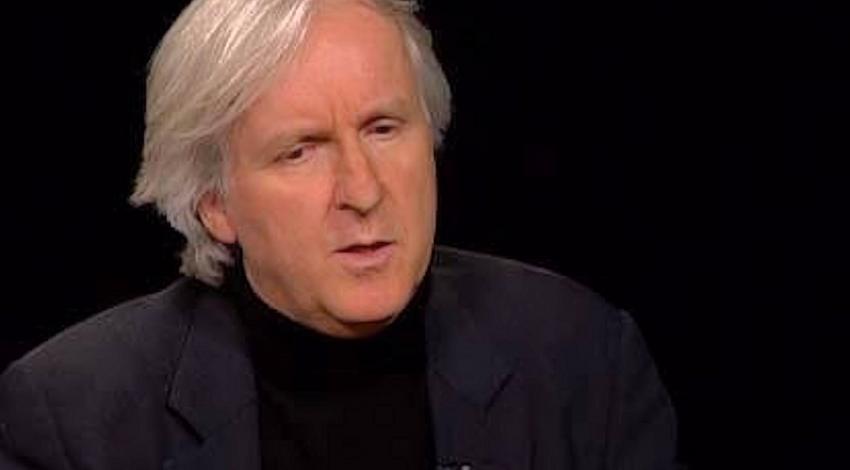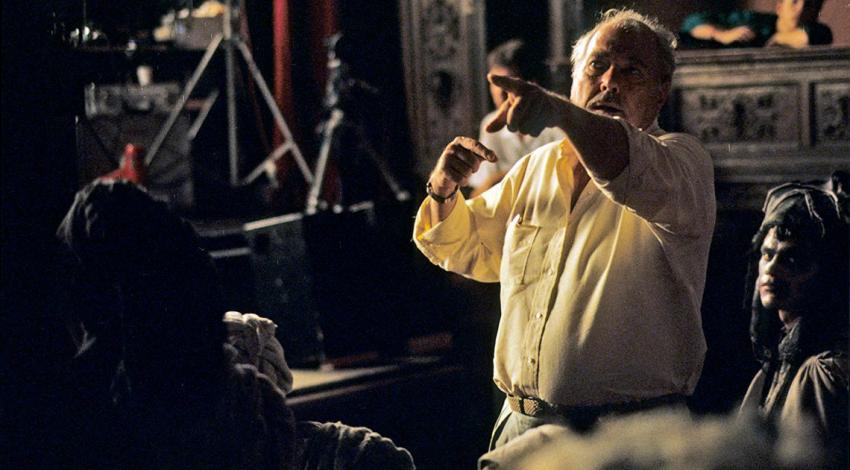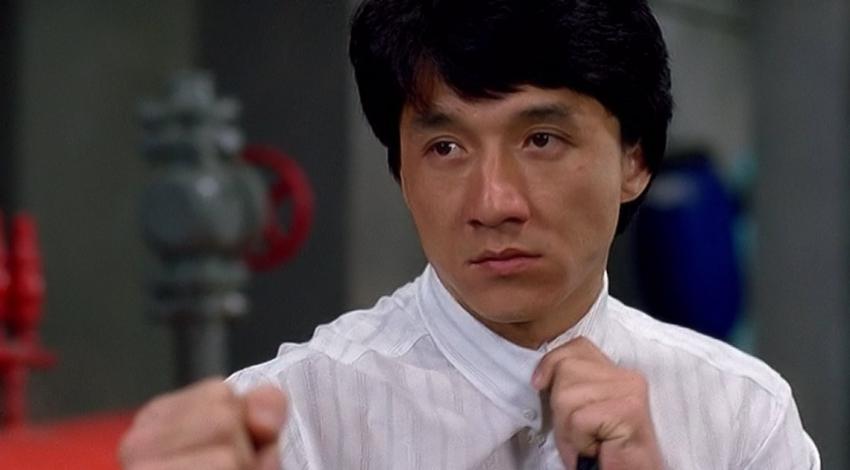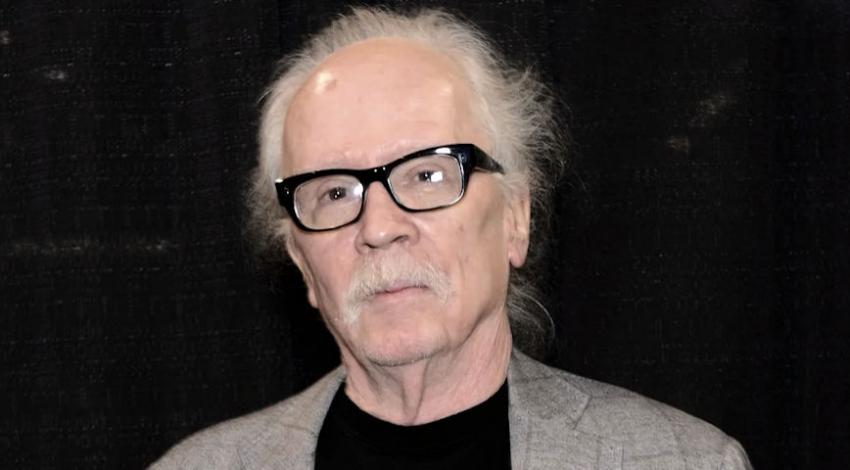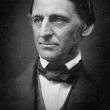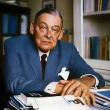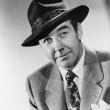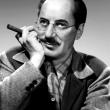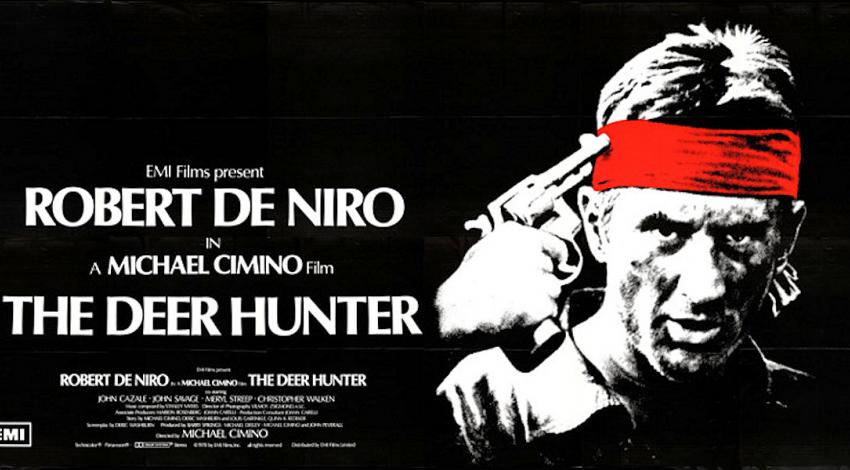John Carpenter talks about "Escape from LA"
Hollywood's Prince of Darkness Destroys LA
by Ted Elrick
DGA Magazine
A gigantic earthquake has turned Los Angeles and environs into an island. The town square, lit eerily by torches and oil drum fires, is covered with graffiti, broken windows and some 400 extras costumed as all manner of anti-social types, from bikers to gangstas.
In director John Carpenter's world, this should come as no surprise. Since his 1976 film, "Assault on Precinct 13", the forces of evil have stood united. It's the forces of good who are continually at war with one another over what to do next.
In the world of Snake Plissken (actor Kurt Russell), the lead character in "Escape from New York" who now finds himself having to "Escape from LA", the "so-called" forces of good -- the police and government -- are sometimes indistinguishable in their methods from the forces of evil.
For "Escape from LA", Carpenter re-teamed with Russell and producer Debra Hill. The Happy Kingdom sequence is part of the finale. At this particular moment the gangs are all blasting their firearms into the air, something generally reserved for New Year's Eve in LA. But this is different. Their leader, Cuervo Jones (actor George Corraface) is riding into their midst and they are happy to see him. In classic Carpenter imagery, Cuervo's car is a "cherry" Buick Invicta convertible covered completely with severed baby doll heads.
Carpenter watches an anamorphic image of the action on a large video monitor. He talks to 1st AD Christian Della Penna who relays instructions to the extras -- more energy, and remember to watch out for flying blank cartridge casings from the 'hot' (loaded) guns.
They run through the scene again. The extras are now ecstatic to see Jones. Carpenter is pleased and moves on to run through the next shot with Corraface.
Months later, the DGA Magazine spoke with Carpenter at his production offices on the Paramount lot as he edited "Escape from LA" for its August [1996] release date. Carpenter talked about the film, his methods and other upcoming projects -- a documentary on Howard Hawks and a special laserdisc reissue of his 1982 version of "The Thing".
John Carpenter | Director
How does it feel crawling back into the world of Snake Plissken?
quote-leftThe weekend before we started principal photography, I was sitting around my house, brooding. My wife and my son said, "What's wrong with you?" I said, "I'm worried that I don't know the style." The original "Escape from New York" was written in 1974 and wasn't made until 1981. That was a young man's idea, it was a vision of somebody who saw things differently. Now, I'm an old veteran. Am I going to be able to get back in the saddle again?
Were you?
quote-leftWell, with the first shot I realized, "What am I worried about?" It's like riding a bicycle. Or for me, like flying a helicopter. You just start it up and there you go.
You worked with a lot of the same people. Debra Hill produced and co-wrote the script with you and Kurt Russell?
quote-leftYes. And we have more ambition in the movie in terms of what you're going to see on the screen. Kurt is just amazing as this character. His work is my favorite kind of work in that it's somewhat invisible. He doesn't show off. He's extremely funny.
And I had more toys at my disposal because we're at a big studio now with a big budget. Back then, it was a $7 million film. We were working for Avco Embassy; it was an independent film. On the first day on "Escape from New York", the Panaglide broke down so we had to use the sound cart as a dolly. Nowadays things are not as dire as that. So you've got more time on this kind of budget.
Let's face it, movie-making is just a question of time. How many set-ups do you get? How much coverage can you get in a scene? In the old days, I would be forced into doing big master scenes, one shot, several takes and move on to the next because we didn't have any time.
You've always resisted sequels, why this one?
quote-leftKurt is fun to work with and there is a story. It's got a little subversive message to it. The United States is a theocracy and it deports the morally guilty to LA. So they send atheists, teenage runaways and abortion doctors over to LA; they get them out of the new Moral America. Cliff Robertson is the president, so there's a little juice to it. In addition, LA has just been through riots, mudslides, fires and earthquakes. Kurt had a great idea. He said, "All these disasters happen and we all sit around in denial. We all say, 'Why should I leave? It's great.'" That was the germ of it. A combination of having a good plot with a little subversive juice and having some fun.
Comparing your body of work in terms of complexity and challenge, where would you rank "Escape from LA"?
quote-leftI'd have to say "Escape from LA" ranks high as a physical and emotional challenge. The whole picture takes place at night. Getting through 70 days of mostly night shooting can't really be accomplished with just adrenaline and coffee. You need a strong will and good shoes.
In "Escape from LA", you've once again got representatives from every cultural and ethnic background in a united gang, a united evil. That seems to be a common theme in your work -- the forces of evil work together while the forces of good can't seem to trust one another or get along...
quote-leftIt seems to be part of an observation on life. True evil really gets organized and dedicated. Look at the Nazis. Yet, before we entered the war there were people who were Nazi sympathizers; we were arguing and bickering with each other. It took the bombing of Pearl Harbor for the country to say, "Okay, that's enough." And look at the country now. You've got some of these Christian identity folks who want to start a race war. They say they need to get rid of the Zionist-occupied government. They need to get rid of all the Jews, all the Blacks. They're white, Christian, right- wing racists called Freemen and Militiamen. They're organized without a leader. I take the side of the guys who try to maintain order. You know, none of us get along. We're not as organized as they are because we're not as crazy and evil.
How much of your films are storyboarded?
quote-leftThe effects sequences. In "Escape from LA", we have a sequence where Kurt's in a submarine and he gets launched out into the San Fernando Sea. He's underwater in this nuclear sub, going across the ruins of Van Nuys, up the freeway, through Universal's Black Tower and the tour which he smashes to pieces. He surfaces, hits the hillside and gets stuck. Well, that's all worked out ahead of time so we all know what screen direction the action is going. Those things have to be storyboarded. But dramatic scenes with actors, no...
How about rehearsals?
quote-leftUsually, if you have your druthers and if everything is perfect -- but it never is -- you have a read-through with all the actors in a room. They just read their lines, sit and talk. Nobody has to perform anything. Then we hit the floor [production] and start working. On a typical day, I'll come in and the AD will call rehearsal. I'll sometimes just work with the actors for about ten minutes, then we'll bring the rest of the crew in. I'll say, "Okay, you come through that door," and so forth. We run through it. Panavision very kindly gave me an anamorphic viewfinder. I pick a spot and stand there looking through the viewfinder. The camera people mark my feet and I'll just watch the actors. I'll move and the camera crew will mark where I go. I'll pull back and they follow. Then I say, "That's it. You guys got it?" They light it and we come back and shoot it.
What do you look for in a cinematographer?
quote-leftA lighting cameraman is what I need. I don't need a director of photography. I don't need somebody to tell me what lens to use and where to put the camera. I need them to light the shot. I worked with William Fraker and it was just a blast. He can light anything beautifully. What I [contributed] was where to put the camera. We work hand in glove. And Gary Kibbe [cinematographer on "Escape from LA"], the same way. He's a painter.
One day I was talking to Fraker and I said, "Bill, explain to me how it goes on some other films? I don't know. I've only worked on John Carpenter movies." He said, "Let me tell you. I go there and the directors rehearse the actors for a couple of hours then look at me and I come up with two ways of shooting a scene." I said, "What are they doing?" If you don't direct the visuals, what are you directing? You're not a director, you're a dialogue coach. You've got to know lenses...
You also compose a lot of the music for your films, sometimes in collaboration with others. Could you talk about that?
quote-leftI have a little home set-up. I do most of the melodic sketches. As a composer I'm a carpet guy. I'm the guy that comes in and you say, "Hey, I've got a scene here." I stare at the movie and say, "It needs some help," so I carpet it to help you get through the scene and emphasize it. It's like laying down carpet in your house so that you have a pleasant time.
Do you have the music in mind while you're making the films?
quote-leftI've tried that before but it never works out. We'll revisit the "Escape from New York" theme in "Escape from LA". We'll bring that back a bit, but we'll bring it into the '90s.
Do you rewrite a script before you begin production?
quote-leftSometimes, sometimes not. It depends on the story. Kurt, Debra and I did a lot of writing on this. Many, many drafts. I worked harder on this script than I have in a long time. Writing is never my favorite thing. It's hard work, you're lonely, there's not a lot of perks to it. You've just got to crank out the pages and I'm still sort of a pre-computer fellow. So I take a little more time on a script because I'm a little ancient in my abilities. I have a nice super electric IBM typewriter. It has a little memory in it but not too much. I rewrite and rewrite and it's painful, but somebody's got to do it.
I understand you're planning a documentary on Howard Hawks...
quote-leftI've been working on that for years, and every time I get somebody interested, there's always the problem of how much money they're willing to spend on it. The BFI [British Film Institute] wants to do it. I want to do it on film; they want it on tape. You can't do a movie about a classic Hollywood director on videotape. I'm sorry; I just won't do that. I'm going to shoot it on 35mm film. We'll get the clips on 35mm film or else I won't do it.
What is it about the work of Howard Hawks that appeals to you?
quote-leftI consider Howard Hawks to be the greatest American director. He's the only director I know to have made a great movie in every genre. Critics mention the one-take, moving camera style of Ophuls and Welles but somehow never get around to the amazing one-take opening shot of the original "Scarface", made in 1932. Hawks' sense of comic timing is unsurpassed. Just take a look at "His Girl Friday" if you're not convinced. In my opinion, the man literally invented American cinema. He showed us ourselves, the way we are, the way we should be.
Did you ever meet Hawks?
quote-leftOh, yeah. He came down to USC. You don't realize the time I was at SC, who I saw -- Howard Hawks, John Ford, Alfred Hitchcock, Orson Welles, Roman Polanski -- they were our guest lecturers. Oh, my God, there they were -- John Huston, John Wayne -- I mean it went on and on, all the time.
Did you get to talk to Hawks?
quote-leftOne night they showed "Red River" and "El Dorado" and they had a big Q&A. After that I had a chat with him. Hawks wasn't the warmest guy in the world. He was a very strong and tough guy. I was extremely intimidated by him at the time. He would always downplay Hollywood. Hawks had a bunch of stories he would recycle for you. He'd tell the same story again and again.
Orson Welles was probably the most fun. He loved being a storyteller. It was basically a campfire scene. He was sitting at the head of the campfire and all of his students were sitting around him. He just told stories. He was the one that told us, "Anybody can direct." And he had this great voice and I was in the front row looking up at him thinking, "This is Orson Welles." He said, "You take the American Cinematographers Manual and study it for a week and you're a director. You know what to do. All this other stuff is crap." He was great.
That must have been a very inspirational time.
quote-leftIt was eye-opening. Roman Polanski came to talk to us and brought a whole different aesthetic to it. He was from a Polish film school. It was unbelievable. Sharon Tate was sitting, pregnant, two rows behind me. That was right before that summer. And Hitchcock would talk and then he'd move onto the patio and he'd keep talking. It was a brilliant time to be in film school.
"The Thing" was an incredibly crafted horror film that more than holds up today. At the time it seemed to have been completely overlooked.
"The Thing" was probably the movie that changed my creative career more than any other. That movie was universally hated by critics and audiences, especially the genre fans. I got reviews on that film that were so... It really affected me because my agent and people around me were calling and saying you have got to change your ways. I lost a job at Universal because of that film. I thought I made this great film.
What happened was it was 1982, the summer of "ET". "The Thing" was the exact opposite of "ET". It wasn't a friendly, fun movie. It was a bleak and grim film. The perception in Hollywood, among my peers was that "The Thing" was a really big, gigantic bomb.
But that attitude has certainly changed over the years.
quote-leftEnormously. In a couple of months, Universal is coming out with the Signature Series laserdisc version of it. Kurt and I narrate the secondary audio track. We got all the cast and crew speaking on camera about "The Thing". Apparently, over the years, it rents off the shelves and has this gigantic afterlife.
But it's funny, people still think of it as a little bit above pornography because it was so strong at the time. They'd never seen a monster like that before. Even "Alien" wasn't as vicious as "The Thing". I had an agent tell me he had to get up and walk out. He couldn't take it. One of the preview ladies threw up in the bathroom after the dog scene. I don't think American audiences were ready or were particularly interested in an invader from outer space like this. I was seeing this movie as a parable of our times. I was seeing a whole different film. The AIDS virus was just a little tiny blurb.
That's what you were thinking?
quote-leftOf course; it's a virus. You catch it in the dark. You don't know who you can trust. That was all underneath. "The Thing" was a virus that got in your blood. It's also a lot like the world we live in right now. Not only can we not trust that we don't have diseases or that we're not some sort of killer inside, but we also don't trust each other, in general, because of the skin color or ideology.
I think it's a film that's as true to its time as Hawks' version in 1951 was true to its time. The original "Thing" is one of my favorite movies because of that. All the scientists, and all the earnestness and the Hawksian camaraderie was very much like '50s America. He really hit it on the head. I was trying to do the same thing, update the people and times. Unfortunately, the perception is that I missed terribly.
It's interesting that both "The Thing" and "ET" were released the same summer by the same studio.
quote-leftIt's hard to remember back then how celebrated "ET" was. It was astonishing the impact the film had. Steven [Spielberg] has a real genius for being able to reach out and touch audiences in a way that makes you look back and say, "Wow, I couldn't have picked that kind of movie to do."
Some would say you reach out and touch audiences in a different way.
quote-leftYeah, but, you know, horror movies and scary movies, unless they're wrapped up in an action situation, don't play much anymore. The horror movie is kind of dead. Last summer there was "Species", an Alien-type picture. A cute girl took her clothes off a lot, which was fun to watch. She was supposed to be lurking around, you know, and there were a couple of scary scenes, but there wasn't anything seriously scary about it. It was a hit. And I think that's about the level that people can tolerate now. The popularity of the old fashioned horror movie, where you're screaming and jumping, has gone.
When "The Thing" aired on the Sci-Fi channel recently, some of the funniest lines were missing, including,"You've got to be f*cking kidding me," and the film became far more grim because of it...
quote-leftSomebody else told me that. In the scene where the little head crawls out, when that line of David Clennon's is dropped out, it is more horrifying. The humor is gone; there is no relief. But there's nothing you can do about that. When a movie goes on television it's just, "Bye, bye. I can't help you." It's interrupted by commercials. I don't even want to be bothered with panning and scanning. I let my DP do that. He's better at it than I am. I'm not going to help them because I didn't make it for TV.
I made a couple of movies for TV and you do what you have to do. You understand where the breaks are going to come. But when you make a feature you make it for the audience in the theatre or for the audience sitting in their home theatre with their laserdisc. It's widescreen, with a great sound system, and that's fine. Just don't cut my movie up with commercials.
Has your membership in the Directors Guild and its clout helped you with any difficulties in your work?
quote-leftI'm very happy that there is a Directors Guild, because when you think about what's going on in the rest of the country, with people losing their jobs and their pensions, the Directors Guild provides a lot of strength for all of us, even ADs and UPMs. As a group we're very powerful because we're the captains of the ship. I wouldn't change anything about the DGA. I would hope that some of the creative rights issues are pushed as hard as possible.
I am a writer, and a director, and let me tell you something, a screenplay is not a movie, it's a bunch of words. The director makes the movie. All this other bullshit can just go away. I've had my screenplays directed by other people. "The Eyes of Laura Mars" was directed by Irvin Kershner and he is the author of that movie, not me. As a director, I am the author of my movies. I know that's not a popular view with the writers, but I'm sorry. If the writer thinks he's an auteur, then let him thread up his screenplay in a projector and we'll take a look at it.
Woody Allen once said he was never completely happy with his finished films. How do you feel about yours?
quote-leftI'm happy if a movie is finished. You've done something that most of the rest of the population never gets a chance to do. The percentage of movies that actually move an audience is minuscule. And if you move an audience and it also affects them, then you've really done something.
I think what makes me realize the joy of directing most of all is when I walk into some place to buy a laserdisc and somebody comes up and mentions a scene from one of my movies and they say, "That was my favorite scene in any film you've ever done; I just wanted to tell you that." That's what it's all about, that is really cool.
In Carpenter's 1988 film "They Live", aliens have settled on Earth, offering material success to a chosen few while the rest of the population becomes poor and homeless. In one of the most chilling moments of the film, the hero stumbles upon some special sunglasses which, when worn, reveal subliminal messages hidden in billboards and magazines. Everywhere there are messages ordering the subconscious to "Consume" and "Marry and Reproduce." Dollar bills reveal the message, "This is your God." The sunglasses also reveal the aliens' true identity.
As he rides across the Paramount lot in a studio golf cart on his way to a photo shoot, Carpenter, wearing sunglasses given to him from a French fan which have the "They Live" logo on the frames, suddenly spots a fellow in jeans and work shirt. After a beat Carpenter says, "He's human." As his golf cart turns a corner, he spots another fellow, this time one wearing a suit and tie. "I'm not sure about him," he says.


